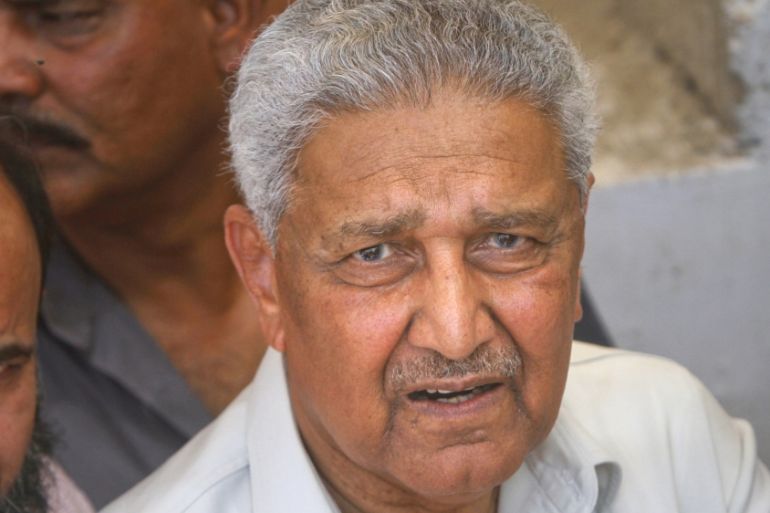‘Kept prisoner’: Pakistan’s nuclear weapons programme architect
Abdul Qadeer Khan tells top court he is being ‘kept prisoner’ by Pakistani agencies and not allowed to plead his case.

Abdul Qadeer Khan, who made international headlines in 2004 after publicly confessing his role in global nuclear proliferation, has petitioned Pakistan’s top court to say he is being “kept prisoner” by government agencies and not allowed to plead his case for freedom of movement.
Khan, widely described as the architect of the nuclear weapons programme in Pakistan that tested its first atomic bomb in 1998 to rival that of neighbouring India, was sacked from his official position after his confession, but granted clemency by then-President Pervez Musharraf.
Keep reading
list of 3 itemsIndia vs Pakistan: Military strength and arsenal
Exclusive: Pakistani Taliban down but not out, says ex-spokesman
He has since lived a heavily guarded and mostly secluded life in an upscale Islamabad neighbourhood. Authorities say he is under guard for security reasons.
“I had been kept as a prisoner having no free movement or meeting with anybody,” Khan said in a handwritten note submitted to the Supreme Court on Thursday.
The 84-year-old is said to have helped supply designs, hardware and materials to make enriched uranium for atomic bombs to Iran, Libya and North Korea.
A global nuclear watchdog, the International Atomic Energy Agency, had said Khan was an important part of the nuclear black market and had help from people in many different countries.
In a televised statement in 2004 after meeting Musharraf, who was also the chief of Pakistan’s powerful army, Khan stressed he acted independently and the government had not authorised his activities.
Western diplomats have long doubted whether he could have acted alone. Talking to The Guardian newspaper in 2008, Khan had said the confession “was handed into my hand”.
‘Physical harm’
Khan filed a petition last year saying that, despite earlier court orders allowing him freedom of movement under agreed terms, he was still kept under restraint and in fear of “physical harm”.
On Thursday, he sent a note to the judges hearing his case saying he was to appear before them the day before, but agents of the Strategic Plans Division (SPD) did not take him to the courtroom despite bringing him into the court building.
The SPD is headed by the Pakistani military and responsible for handling the country’s secretive nuclear weapons programme.
The government of Pakistan, which has been made respondent in the case, did not reply to Reuters news agency’s requests for comment.
The court has directed the government to respond to Khan’s petition.
“We haven’t received notice yet but it will come,” Pakistan’s Attorney General Khalid Jawed Khan told Reuters through a text message, adding the court has to decide if it will accept the petition for regular hearing.
Khan also said in his note to the Supreme Court that he was being forced to withdraw his petition to that court and take it to a lower court.